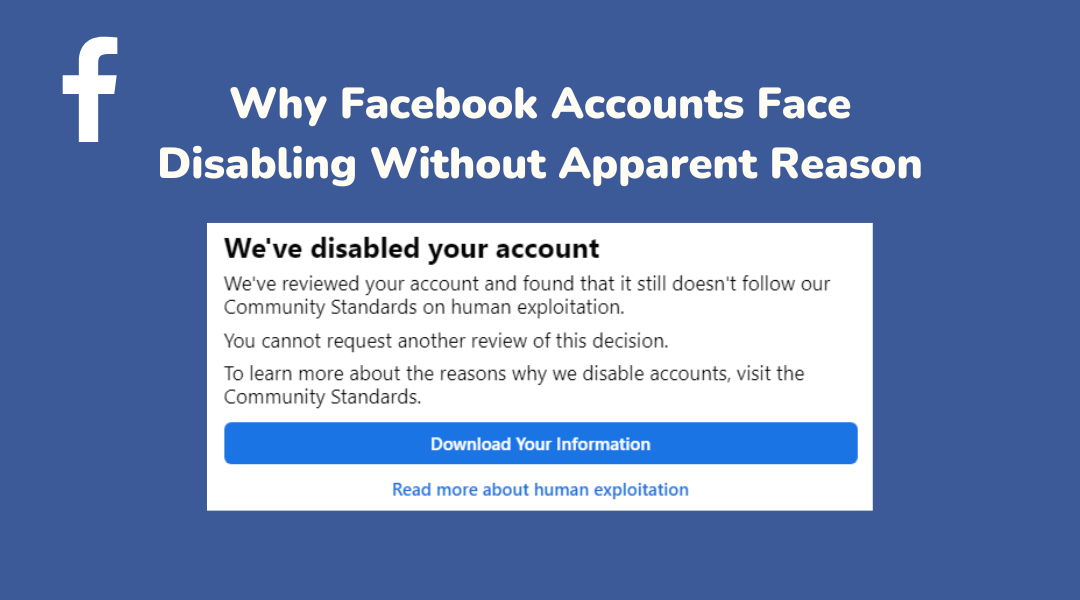In the ever-expanding universe of social media, Facebook stands as a titan, boasting an immense user base that spans the globe. Yet, within this vast digital landscape, a perplexing and increasingly common occurrence continues to confound users: the sudden and seemingly arbitrary disablement of Facebook accounts. This phenomenon has left countless individuals bewildered, frustrated, and clamoring for answers. In this comprehensive exploration, we delve deep into the complexities behind why Facebook accounts are disabled for no apparent reason.
The Rise of Account Disablement: A Growing Concern
The phenomenon of Facebook accounts being disabled without clear cause or warning has become a prevalent and distressing issue. Users from diverse backgrounds and regions report experiencing account disablement despite not knowingly violating Facebook’s community standards or terms of service. The abrupt nature of these disablements leaves affected individuals grappling with uncertainty and seeking clarification.
Unraveling the Mysteries: Probable Causes of Account Disablement
1. Automated Enforcement Mechanisms:
Facebook employs sophisticated algorithms and automated systems to monitor user activity and enforce its community guidelines. While intended to maintain a safe and respectful online environment, these systems are not without flaws. Innocuous actions, such as rapid posting, adding a large number of friends quickly, or engaging in certain patterns of behavior, may inadvertently trigger these automated systems, leading to account disablement.
2. Algorithmic Bias and Lack of Transparency:
Critics argue that Facebook’s algorithms exhibit biases that disproportionately target certain demographics or types of content. The lack of transparency surrounding the inner workings of these algorithms exacerbates the problem, making it challenging for users to understand why their accounts were disabled. Without clear insight into the decision-making process, affected users are left feeling frustrated and disenfranchised.
3. Abuse of Reporting Mechanisms:
Facebook heavily relies on user reports to identify and address violations of its community standards. However, this system is susceptible to abuse, with malicious users exploiting it to silence or harass others. Innocent individuals may find their accounts disabled as a result of false or malicious reports, with limited avenues for recourse or appeal.
4. Technical Glitches and Errors:
Like any complex digital platform, Facebook is susceptible to technical glitches and errors. Bugs in the system or database inaccuracies could inadvertently lead to the disablement of accounts that have not committed any violations. While these occurrences may be rare, they can have significant repercussions for affected users.
5. Policy Changes and Updates:
Facebook frequently updates its policies and community standards in response to evolving societal norms and regulatory requirements. However, these changes can sometimes result in accounts being retroactively flagged for violations that were not considered against the rules at the time of posting. This retrospective enforcement of policies can catch users off guard and lead to account disablement without apparent reason.
The Human Toll: Ramifications of Account Disablement
The disabling of a Facebook account can have profound consequences for affected individuals. Beyond the inconvenience of losing access to their social network and communication channels, users may experience emotional distress, social isolation, and even financial repercussions if their account was integral to their livelihood or business endeavors. The lack of transparency and accountability in the account disablement process further compounds these challenges, leaving users feeling powerless and marginalized.
Toward Greater Transparency and Accountability
In response to mounting criticism and public scrutiny, Facebook has taken steps to improve transparency and accountability in its content moderation practices. Initiatives such as the Oversight Board, an independent body tasked with reviewing content moderation decisions, aim to provide users with recourse and ensure greater consistency and fairness in enforcement actions.
However, the issue of accounts being disabled without apparent reason persists, highlighting the inherent complexities and challenges of moderating a platform of Facebook’s scale and reach. As users continue to demand greater transparency and accountability, it is incumbent upon Facebook to implement more robust safeguards and mechanisms for addressing account disablement.
Conclusion: Navigating the Uncertainty
The disabling of Facebook accounts without apparent reason remains a contentious and distressing issue for users worldwide. While automated enforcement mechanisms, algorithmic biases, and policy changes contribute to this phenomenon, the lack of transparency and recourse exacerbates the problem. As Facebook grapples with these challenges, users are left navigating a landscape fraught with uncertainty and ambiguity.
Ultimately, addressing the issue of account disablement requires a concerted effort from all stakeholders, including users, advocacy groups, and social media platforms themselves. By fostering open dialogue, promoting transparency, and implementing fair and equitable enforcement practices, we can work towards creating a digital ecosystem where users feel empowered, informed, and respected. Only then can we truly unravel the enigma of why Facebook accounts are disabled for no apparent reason.


